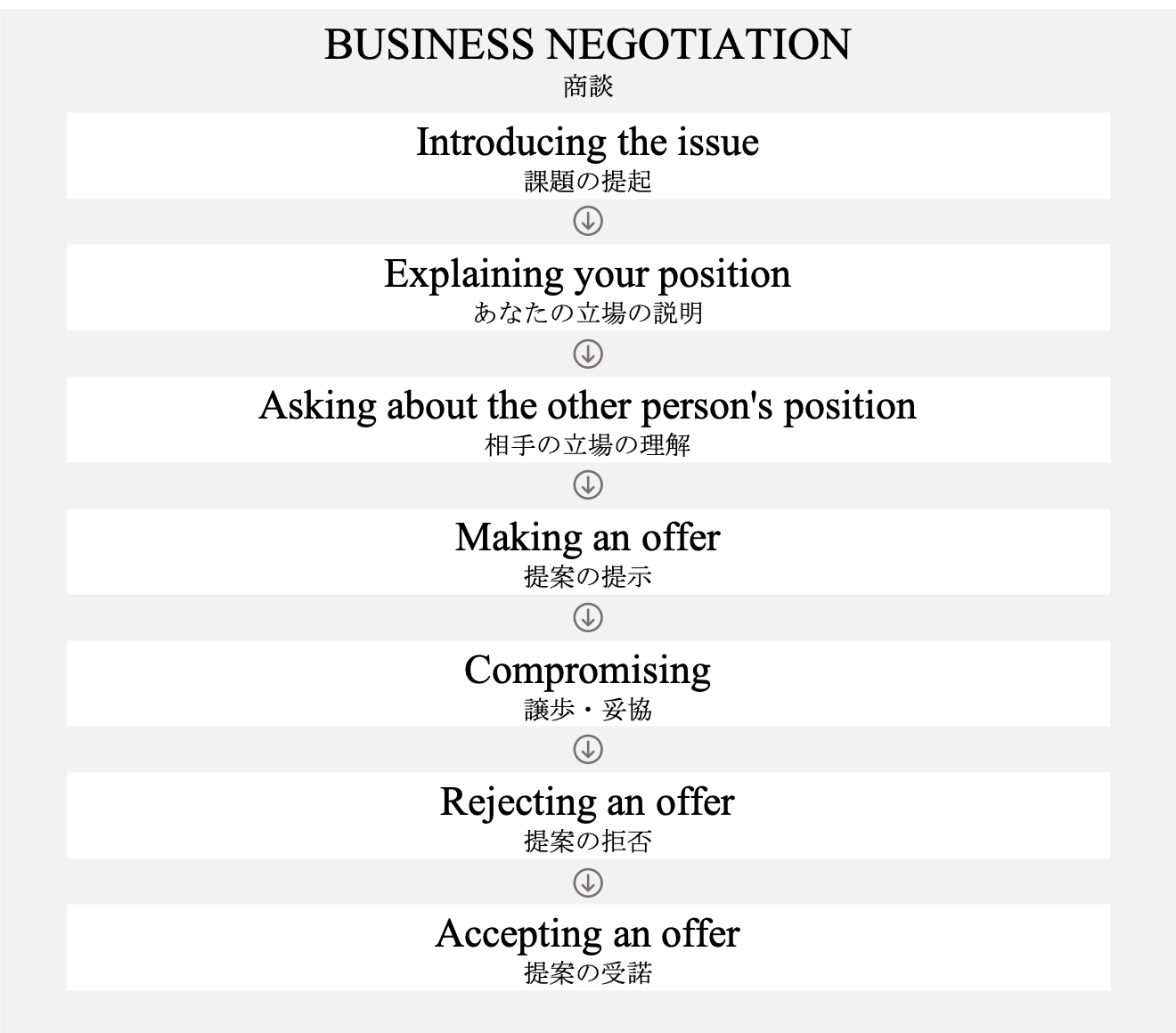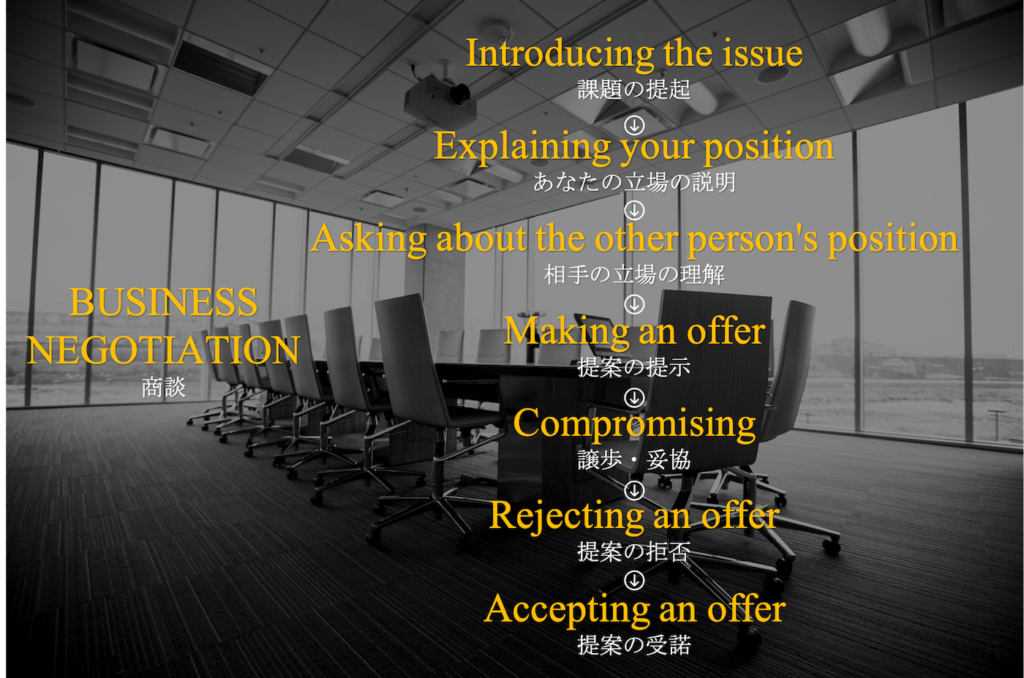商談の場での一般的な交渉の進め方は下記の通り。

このコラムでは、英語での商談をスムースに進めるために、それぞれの場面において頻繁に使用される表現を紹介する。商談を成功させるには準備が全てだ。交渉の流れ、主張・提案とそれらの英語の表現方法などをしっかりと確認しておこう。
商談に気持ちよく入るための商談前の雑談、加えて商談を気持ちよく終了するための商談後の雑談にも注意を払う余裕を持つことも重要だ。それら雑談の英語についても触れておく。
目次
1. Introducing the issue【課題の提起】

1.1. 課題・問題を提起する場合…
I’d/We’d (I would/We would) like to discuss an issue with you.
(ある課題についてあなたとお話ししたい。)
There’s (There is) something we need to discuss.
(議論しなければならないことがあります。)
We have an issue/problem with <the payment terms you told us yesterday>.
(昨日あなた方がおっしゃった支払い条件について課題/問題があります。)
1.2. 課題・問題を確認する場合…
There are three specific areas we would like to discuss. These are <the price, the specifications, and the delivery date of the product X>.
(議論したいことが3つあります。それは、製品Xの価格とスペックと納期です。)
As we agreed at the previous meeting, the purpose of today’s meeting is to discuss <the specifications of the product X>.
(今日の会議の目的は、<製品Xのスペック>について議論することです。)
If you have any other specific points you would like to discuss, please let us know.
(もし他に議論したい点がありましたら教えてください。)
2. Explaining your position【あなたの立場の説明】

Regarding <the price>, my/our position is that <the price shouldn’t be lower than USD 10 per unit>.
(価格に関して、私/我々としては<ユニット当たりの価格は10米ドルを下回るべきではない>ということです。)
The problem/concern I/we have is that <it is difficult to deliver some components on time>.
(私/我々の問題/問題は、<いくつかの部品をスケジュール通りに納品することが難しい>ということです。)
I hope you can see our point of view.
(我々の見解をご理解いただけると幸いです。)
3. Asking about the other person’s position【相手の立場の理解】

What’s (What is) your position?
(あなた/あなたがたのお考え/お立場はいかがですか?)
Do you have any views/concerns about <the price, the specifications, or the delivery date of the product X>.
(<製品Xの価格やスペック、納期について>どのようにお考えですか?/懸念点はありますか?)
You position is very interesting. Can you tell me more?
(あなた/あなた方の考え方は非常に興味深いです。詳しく教えてもらえますか?)
4. Making an offer【提案の提示】

Let me make you an offer.
(ご提案をさせてください。)
What/How about if I/we offered you <a 5 percent discount>?
(もし、私/我々が<5%の割引き>をご提案したらいかがでしょうか?)
I/We propose <a 5 percent discount>. Would you consider <delaying the delivery date>?
(私/我々は<5%の割引き>を提案したい。<納期を遅らせること>を考えてもらえますか?)
Imagine/Supposing we <pay 5% more for the components, can you deliver them on time>?
(<部品価格を5%上乗せした>としましょう。その場合は<時間通りに納品できますか>?)
5. Compromising【譲歩・妥協】

In return, would you consider <paying 8% more for the components>?
(そのかわりに、<部品価格の8%上乗せ>を考えてもらえますか?)
If I/we offer <to pay you 8% more for the components>, will you <deliver them on time>?
(もし、私/我々が<部品価格を8%上乗せ>すれば、時間通りに納品しますか?)
I’ll meet you halfway on that.
(それについては歩み寄りましょう。)
I/We can’t accept that, but I/we can offer you <a 3 percent discount>.
(それは受け入れられませんが、<3%の割引き>はご提示できます。)
No, but how about if <I/we offer to pay you 3% more for the components>.
(それはノーです。しかし<私/我々が部品価格の3%上乗せをご提案する>としたらいかがですか?)
What do you think is a fair way to resolve <the delivery date of components>?
(<部品の納期>について解決する良い方法はありませんか?)
We could meet each other somewhere in the middle.
(どこか中間で折り合うことができないかと思います。)
How can we reach a compromise?
(どのようにしたら妥協点を見出せますか?)
6. Rejecting an offer【提案の拒否】

I’m sorry, but I can’t agree to that.
(すみませんが、それは受け入れられません。)
I’m afraid that isn’t possible.
(すみませんが、それは不可能です。)
I’m not in a position to accept that.
(それを受け入れることはできません。)
Can you offer us any other possibility?
(他の可能性をご提案いただけますか?)
7. Accepting an offer【提案の受諾】

I think that would be fair.
(それは妥当だと思います。)
That seems reasonable.
(それは妥当だと思います。)
I can agree to that.
(それには同意します。)
It’s a deal.
(それで手を打ちましょう。)
8. Ice breaking【商談前にすべきこと】

商談をスムースに進める上で、商談が始まる前のコミュニケーションは非常に重要である。特に、初めて会う方がいる場合は、時間が許す限り自己紹介などは済ませて、できるだけ打ち解けた雰囲気で商談を始めよう。
商談前の Ice Breaking で使えるフレーズを紹介しておこう。
8.1. まずは挨拶しよう。
How do you do? I’m <Taro Tanaka>.
初めまして。<田中太郎>です。
→ Nice to meet you. I’m <John Smith>.
お会いできてうれしいです。<ジョン・スミス>です。
Excuse me, are you <John>? Nice to meet you. I’m <Taro Tanaka>.
すみません。<ジョンさん>ですか?お会いできてうれしいです。<田中太郎>です。
→ That’s (That is) right. Pleased to meet you.
そうです。お会いできてうれしいです。
8.2. 自己紹介をしよう。
Let me introduce myself. My name is <Taro Tanaka>. I’m in charge of <the marketing department>.
自己紹介させてください。<田中太郎>と申します。<マーケティング部門>の責任者です。
8.3. 相手のことも聞いてみよう。
How about you?
あなたは?
What are your main responsibilities?
あなたは何をされているのですか?
8.4. 他の人に紹介しよう。
May I introduce you to <Jiro Suzuki>?
<鈴木二郎>をご紹介させてください。
Mr.<Smith>, have you met <Jiro Suzuki>?
<スミス>さん、<鈴木二郎>とお会いになりましたか?
8.5. ここまでの道程について聞いてみよう。
When did you arrive (here)?
いつ(ここに)着いたのですか?
→ I arrived <yesterday afternoon>.
<昨日の午後>に着きました。
How was your trip?
行程は如何でしたか?
→ Everything went fine. No problem at all.
全て順調でした。全く問題ありませんでした。
→ My flight was delayed a little.
飛行機が少々遅れました。
Did you have any problem finding us?
場所はすぐにわかりましたか?
→ I had no problem at all.
全く問題ありませんでした。
8.6. 滞在先などについて聞いてみよう。
Where are you staying?
どこにご滞在ですか?
→ I’m (I am) staying at <Hilton hotel>.
<ダウンタウンのヒルトンホテル>に滞在しています。
How’s (How is) the hotel?
ホテルは如何ですか?
→ It’s very comfortable. The service is excellent.
とても快適です。サービスは非常に良いです。
How long will you be staying in <Tokyo>?
<東京>にはどれくらい滞在されるのですか?
→ About <a week>.
<一週間>程度です。
How do you like <Tokyo> so far?
今までのところ <東京>は如何ですか?気に入りましたか?
→ It’s great. I’m really enjoying it.
素晴らしいです。とても楽しんでいます。
8.7. 天気について聞いてみよう。
How’s the weather in <London>?
<ロンドン>の天気は如何ですか?
→ It’s (It is) <freezing/chilly/warm/hot> in <London> <this year>.
<今年の><ロンドン>は、<ひどく寒い/ひんやりする/暖かい/暑い>です。
→ It’s (It is) <awful/terrible/miserable/beautiful/wonderful> in <London> <this year>.
今年の <ロンドン>は、<ひどい/とても不快/憂鬱/すてき/素晴らしい>です。
英語の雑談についての詳細は「雑談の英語|ビジネスでの雑談を楽しめる状況別フレーズ100選」を参考にしてほしい。
9. After negotiation【商談後にすべきこと】

商談がうまくいった場合は相手の方々を食事に誘ってみては?親しくなっておけば、今後のビジネス上のやりとりもやりやすくなる。ここではディナーへの招待の際に使えるフレーズを紹介しておこう。
9.1. さっそくディナーに招待してみよう。
We were wondering whether you could come to dinner <sometime next week>?
<来週のいずれかの日に>ディナーにお越し頂きたいのですが?
We’d (We would) like to invite you to dinner <sometime next week>.
<来週のいずれかの日に>ディナーにご招待したいのですが。
9.2. もしあなたが招待を受けた場合:受けるときは…
That would be nice/great/wonderful.
それは良い/素晴らしいですね。
I’d (I would) love to.
是非お願いします。
9.3. もしあなたが招待を受けた場合:断るときは…
I’d love to, but <I have to catch the flight>.
そうしたいのですが、<飛行機に乗らなければなりません。>
I’m sorry, but <I’ve got another appointment>.
申し訳ありませんが、<他の約束があります。>
9.4. 日時を決めよう。
Would <friday evening> be okey with you?
<金曜日の夜>はいかがですか?
What’s a good time? Shall we say <6 o’clock>?
何時がよろしいですか? <6時>はいかがですか?
→ <Friday evening> would be fine.
<金曜日の夜>で結構です。
→ That sounds fine with me.
それで結構です。
9.5. 場所については…
Do you have any particular place in mind?
どこかの場所をお考えですか?
→ There is a <bar and grill> near <our office>.
<バーとグリルのお店>が<我々のオフィス>の近くにあります。
→ I’ll email you a map later.
あとで地図をメールします。
9.6. 行き方については…
What’s the best way of getting there?
一番よい行きかたを教えてもらえますか?
→ I’d (I would) recommend that you <take a taxi>.
<タクシー>を使うことをおすすめします。
9.7. 最後に確認…
Let me just confirm that. <Thursday at 6:00> at a <bar and grill> near <our office>.
確認させてください。<木曜日6時>に<弊社の>近くの<バーとグリルのお店>ですね。
I’m looking forward to it.
楽しみにしています。
※ 取引先の場合は必ず確認のメールも送付しておきましょう。
ディナー中の雑談についての詳細は「雑談の英語|ビジネスでの雑談を楽しめる状況別フレーズ100選」を参考にしてほしい。

『ビジネス英語必携表現集』
シーン別・時系列で完全網羅(全123ページ)
英語を効率的に習得する上で、頻繁に使用される定型フレーズや言い回しを覚え、使えるようにしていく学習は必須です。特にビジネスで使用される英語は、定型フレーズの占める割合が高いといわれています。本書を活用して頂き、ネイティブにとってナチュラルな英語を使えるようにしていきましょう!
無料eBookの主な内容
- 電話の英語
- 受付の英語
- メールの英語
- 雑談の英語
- プレゼンの英語
- 会議の英語
しかしながら、真のスピーキング力を身につけるには、定型フレーズを覚える「トップダウン学習」だけでは不十分です。単語・文法・発音を組み合わせて無限の文章を自由自在に使えるようにする「ボトムアップ学習」も同時並行的に行うことをお勧めします。



